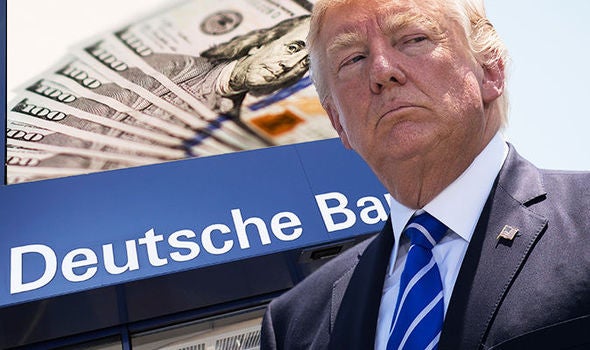
When other banks considered Mr. Trump too risky a client, Deutsche was the lone bank that stuck with the flamboyant businessman—through defaults, forged documents, and other red flags—lending him $2bn.
Eager to expand in the United States, the German multinational bank had a ravenous appetite for risk and limited concern about its clients’ reputations.

Access deeper industry intelligence
Experience unmatched clarity with a single platform that combines unique data, AI, and human expertise.
Time after time, with the support of two different chief executives, the bank handed money — a total of well over $2bn — to a man whom nearly all other banks had deemed untouchable.
Trump was a serial defaulter
In 2003, Deutsche Bank helped Mr. Trump’s casino company sell hundreds of millions of dollars in bonds. (The salesmen were rewarded with a trip to Mar-a-Lago.) Mr. Trump’s company defaulted in 2004, leaving Deutsche Bank’s clients with deep losses.
Badly bruised, the bank’s investment division that sold the bonds vowed to not do business again with Mr. Trump.
A year later, though, Mr. Trump approached another part of the investment division for a $640m loan to build a skyscraper in Chicago. It made the loan — and in 2008, Mr. Trump defaulted and sued Deutsche Bank.

US Tariffs are shifting - will you react or anticipate?
Don’t let policy changes catch you off guard. Stay proactive with real-time data and expert analysis.
By GlobalDataThat prompted the whole investment division to sever ties with Mr. Trump.
And then, three years after his previous default, Deutsche Bank started lending to him again, this time through the private-banking division that catered to the superrich.
In fact, it lent Mr. Trump money that he used to repay what he still owed Deutsche Bank’s investment division for the Chicago loan.
Top bank executives supported the relationship
Since Mr. Trump won the 2016 election, Deutsche Bank officials have been trying to minimise the importance of their business with the new president, arguing that some senior executives didn’t even know the relationship existed.
But two of Deutsche Bank’s chief executives — as well as numerous other senior executives — knew about and at times aided the relationship.
In late 2011, as the bank debated whether to resume lending to Mr. Trump after his 2008 defaults, a senior executive asked Josef Ackermann, who was in his last months as chief executive, about the potential loans.
Mr. Ackermann gave a thumbs up, according to people familiar with the process. (Mr. Ackermann said in an interview that he didn’t recall being involved.)
His successor, Anshu Jain, was briefed on the Trump relationship early in his tenure.
In February 2013, Mr. Jain accompanied Rosemary T. Vrablic — Mr. Trump’s personal banker at Deutsche Bank — to Trump Tower in Manhattan, according to two former executives.
Over lunch, Mr. Jain remarked to Mr. Trump that he was surprised by his relatively low levels of debt. Ms. Vrablic told her colleagues that Mr. Jain had sounded upbeat about Mr. Trump’s finances.
Deutsche Bank’s board ordered a special report into Trump lending
In 2016, the board of directors commissioned a report into how the bank had become so enmeshed with Mr. Trump.
The report, prepared by the board’s integrity committee, concluded that Deutsche’s private-banking division, which catered to very rich individuals, was so determined to win business from big-name clients that its executives had looked past Mr. Trump’s history of stiffing his lenders and for engaging in demagogy, according to a person who read the report.
The review also found that Deutsche Bank had produced a number of “exposure reports” that flagged the growing business with Mr. Trump, but that they had not been adequately reviewed by senior executives.
Board members found that the Trump relationship was a symptom of a broader problem with the bank’s siloed management structure and a culture of getting deals done at all costs.
Forged loan documents and loyal friends within the bank
Mr. Trump’s first point man at Deutsche Bank was Mike Offit, who arranged loans to renovate 40 Wall Street and to build a tower opposite the United Nations.
He and Mr. Trump grew friendly, golfing and attending boxing matches together. Mr. Trump even wrote in a June 1998 letter to Mr. Offit’s father saying, “you have a great son!”
In 1999, a senior Deutsche Bank executive discovered that a credit officer’s signature on a Trump loan document had been forged. Mr. Offit was never accused of forgery and the loan did not go through. He was later fired.
Next, another banker, Justin Kennedy, stepped up to help lead the bank’s commercial real estate group. Mr. Kennedy was the son of Supreme Court Justice Anthony Kennedy, who occasionally visited Deutsche Bank’s offices.
The younger Kennedy developed a relationship with Mr. Trump and helped him borrow money from Deutsche Bank, including on the fateful Chicago project.
Finally, there was Ms. Vrablic. Deutsche Bank recruited her to its private-banking division in 2006. One of her existing clients was Jared Kushner, who later introduced her to his father-in-law, Mr. Trump, according to a person familiar with the relationship.
Ms. Vrablic steered more than $300m in loans to Mr. Trump over the ensuing years. When Trump was sworn in as president, Ms. Vrablic sat in the V.I.P. section of the audience.







